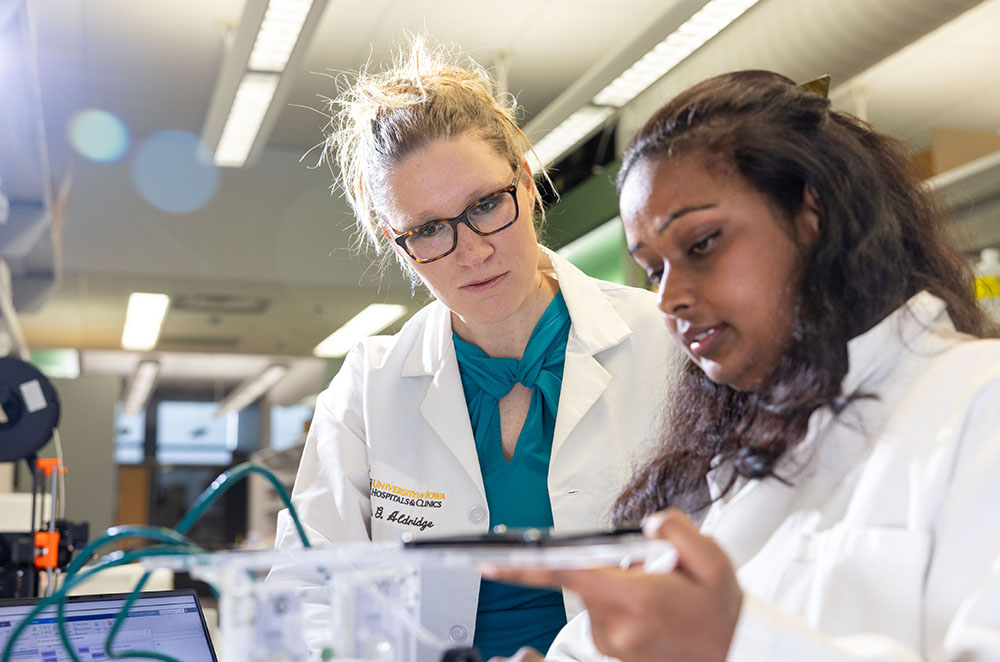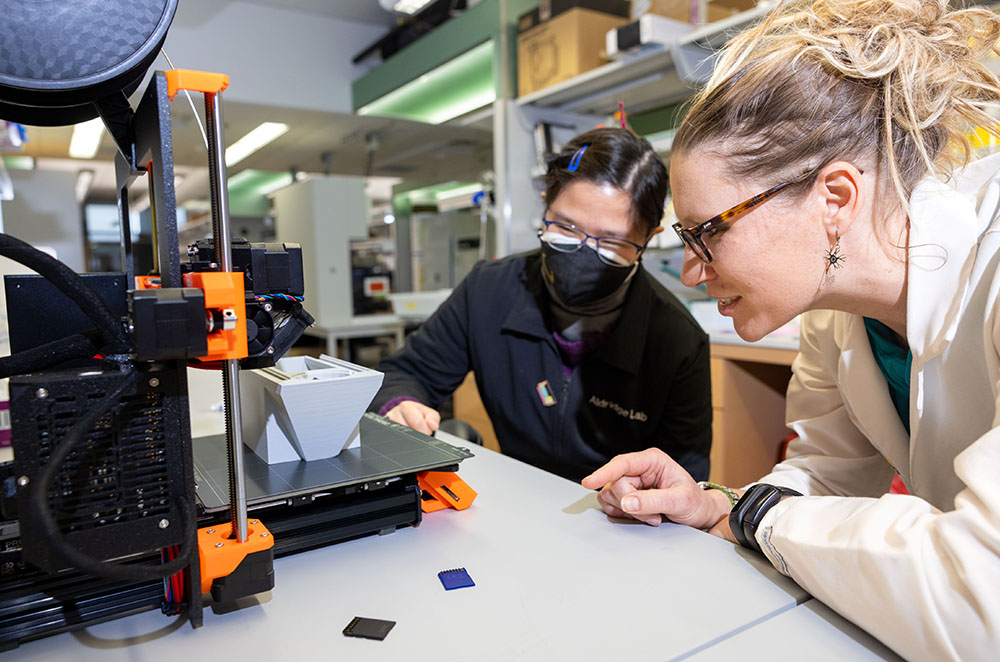Iowa Researcher Advancing Treatments, Care for Lewy Body Dementia Patients
 PHOTO: Liz Martin/University of Iowa Health Care
Georgina Aldridge (left), a top neurologist and neuroscientist, specializes in treating and diagnosing patients with Lewy body dementia.
PHOTO: Liz Martin/University of Iowa Health Care
Georgina Aldridge (left), a top neurologist and neuroscientist, specializes in treating and diagnosing patients with Lewy body dementia.
It’s a phone call Georgina Aldridge will never forget.
Nearly 15 years ago, Aldridge was a PhD student, when she got a call from a mentor and friend.
 PHOTO: Liz Martin/University of Iowa Health Care
Georgina Aldridge
PHOTO: Liz Martin/University of Iowa Health Care
Georgina Aldridge
“He told me that there were people outside his house with guns, and they were trying to kill him,” says Aldridge. “He wanted me to call 911 because he had been kidnapped. I was quite shocked.”
Aldridge, along with many of her peers, started to know something was wrong with their professor, who was in the prime of his career as a neural development and brain plasticity researcher. It wasn’t until his death in 2014 that they had an answer.
He had Lewy body dementia, a disease where abnormal deposits of protein affect chemicals in the brain and lead to thinking, movement, behavior, and mood issues. It’s the second-most common form of dementia in the U.S.—with more than 1 million Americans living with the disease—and it’s been diagnosed in celebrities such as actor and comedian Robin Williams and all-star baseball pitcher Tom Seaver.
Yet, there is little known about the disease that blends symptoms such as hallucinations and dementia together. For Aldridge, the diagnosis of her mentor provided clarity and a pivot in her professional aspirations.
Using research to explore Lewy body dementia treatments
Since arriving at Iowa 11 years ago, Aldridge has dedicated her professional career to exploring Lewy body dementia symptoms and treatments. She’s part of the Iowa Center for Neurodegeneration, which includes more than two dozen researchers working together to find answers to Alzheimer’s disease, Amyotrophic Lateral Sclerosis (ALS), frontotemporal dementia, Lewy body dementia, Parkinson’s disease, and more.
Aldridge uses mouse models to investigate Lewy body dementia symptoms to see what connections in the brain may cause the condition.
“Mice are very simple beings, but they do have a lot in common with humans,” says Aldridge. “In some ways they’re closer to us than dogs. With my studies, I’m placing Lewy body proteins in the top of the brain—the cortex—and in the part of the brain that makes norepinephrine and seeing what symptoms are exhibited and what circuits are impacted.”
At Iowa, neuroscience groups such as the Aldridge Lab take on some of the most challenging cases throughout the Midwest, and she’s worked with some of her patients for many years.
“We have a large catch-net of patients, and they tend to stay—allowing us to be part of their entire journey through their diseases,” says Aldridge. “These relationships have important consequences for how we design both our human and animal research. Some of my patients have since died. Because they donated their brains, we’ve been able to look at what cells were hurt, what circuits were impacted, and discover differences that we wouldn’t have found otherwise.”
Unlike other forms of dementia, people who are affected by this disease also exhibit psychiatric symptoms—bringing hallucinations and dementia together, as well as depression, anxiety, panic attacks, sleeping problems, and mood issues.
“One moment our patients are really smart and talking to you. The next moment they drop down into delirium,” says Aldridge. “That’s called a fluctuation. These patients have problems everywhere inside their brains, so it’s something we can study. The problem is there’s actually too much going wrong.”
While Aldridge is using mouse models to advance research, she’s also part of a recently released study that found that certain drugs used to treat enlarged prostates may also decrease the risk for Lewy body dementia.
“Diseases like dementia with Lewy bodies, or Parkinson's disease, or Alzheimer's disease are debilitating, and we don't really have any good treatments that can modify the disease progression,” said Jacob Simmering, an assistant professor of internal medicine at Iowa, who led and authored the study. “We can treat symptoms, but we can’t actually slow the disease. One of the most exciting things about this study is that we find that same neuroprotective effect [from the prostate drugs] that we saw in Parkinson's disease. If there is a broadly protective mechanism, these medications could potentially be used to manage or prevent other neurodegenerative diseases.”
 PHOTO: Liz Martin/University of Iowa Health Care
For more than a decade, Georgina Aldridge (right) has dedicated her career to exploring Lewy body dementia treatments and symptoms.
PHOTO: Liz Martin/University of Iowa Health Care
For more than a decade, Georgina Aldridge (right) has dedicated her career to exploring Lewy body dementia treatments and symptoms.
From bench to bedside: Helping treat Lewy body dementia symptoms
Beyond her research efforts, Aldridge sees patients with all types of dementias in clinic. Unlike some dementias, dementia with Lewy bodies is now diagnosable in life.
“The protein that’s involved gets into nerves throughout your body, and it’s so much in your nerves that I can actually perform a skin biopsy to diagnosis it,” says Aldridge. “A specific protein, synuclein, is building up and ruining certain types of cells. My patients with Lewy body dementia each present very different symptoms—one person’s disease starts with hallucinations, another with insomnia. If we can connect which cells die with one symptom or another in this disease, we may better understand these complex symptoms across the population.”
In 2021, the Roy J. Carver Charitable Trust funded a patient registry so that Aldridge and her colleagues could start tracking and seeing Lewy body dementia symptoms as they happened. Now, with a $375,000 gift from the Stead Family Scholars program, Aldridge and her team are expanding the registry beyond 25 patients.
Since 2022, the Stead Family Scholars program has supported early-career tenure-track faculty with outstanding research and leadership potential in their respective fields. Jerre Stead (65BBA), whose mother battled Alzheimer’s disease for 14 years, says he’s proud to be helping advance research related to all forms of dementia.
“Nothing else takes a person away from family like dementia,” he says. “Mary Joy and I always said that if we got the opportunity, we were going to invest to help change the world. Fortunately, we’ve been blessed, and we’re able to contribute to what we hope will be life-changing and life-saving research.”
Using various wearable devices, biosensors, and daily journaling, Aldridge is tracking patients’ sleep and how it affects their moods—with the hope of discovering Lewy body dementia treatments based on the individual patient. Currently, Aldridge’s neuroscience group is tracking patient medications, changes in their daily routines, and more.
“Through wearable devices, we might be able to tell that someone slept poorly, and that may cause that person to have a bad day in 24 to 48 hours,” says Aldridge. “We’re looking for predictors that things might go badly soon. If we can predict those fluctuations, we may be able to set up an intervention.”
Aldridge’s goal is to continue to find Lewy body dementia treatments and interventions, but she also wants to create a patient-focused dementia community center that integrates research into their lives and improves care.
Wherever her research takes her, Aldridge is thrilled to be doing it at Iowa.
“My time here has exceeded my wildest expectations,” she says. “At every stage I’ve gotten incredible mentorship as I’ve been able to make my professional and personal dreams a reality.”
